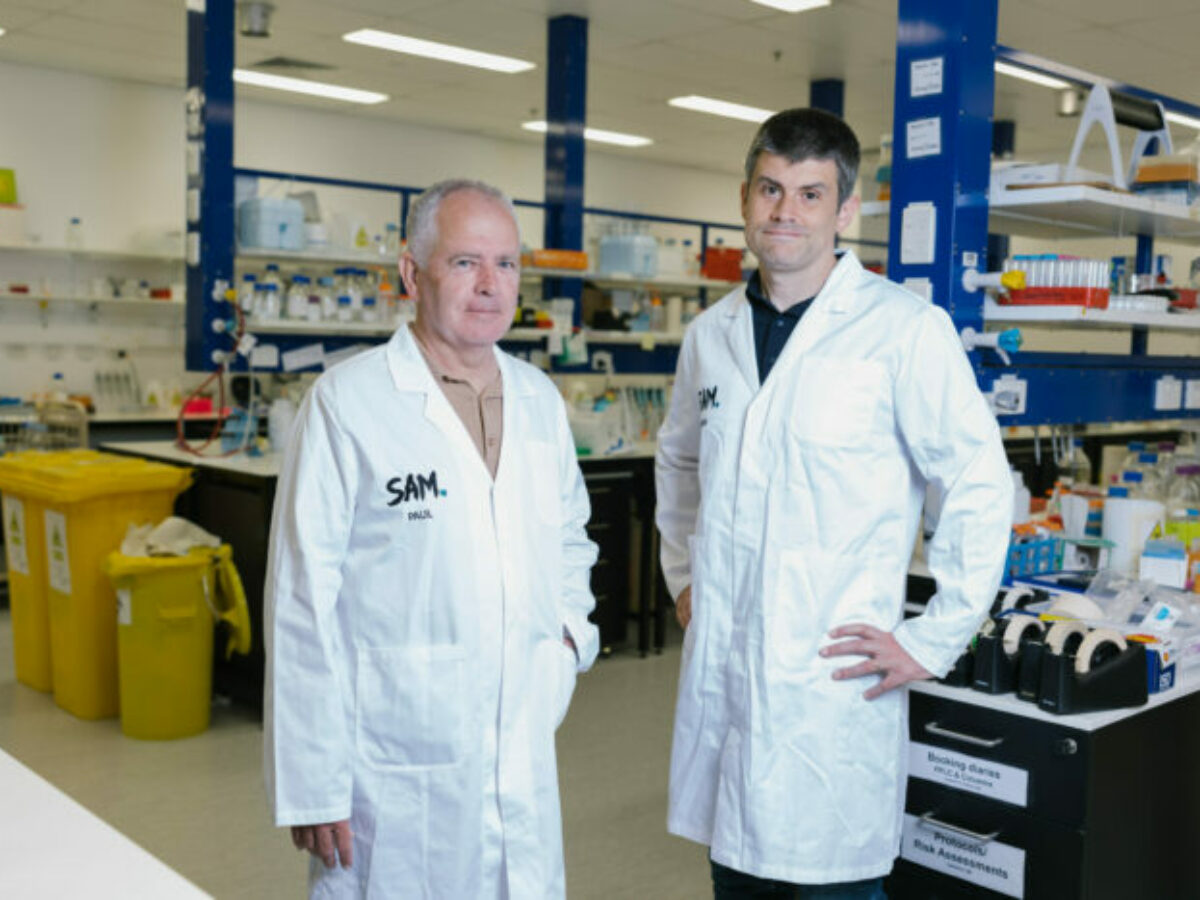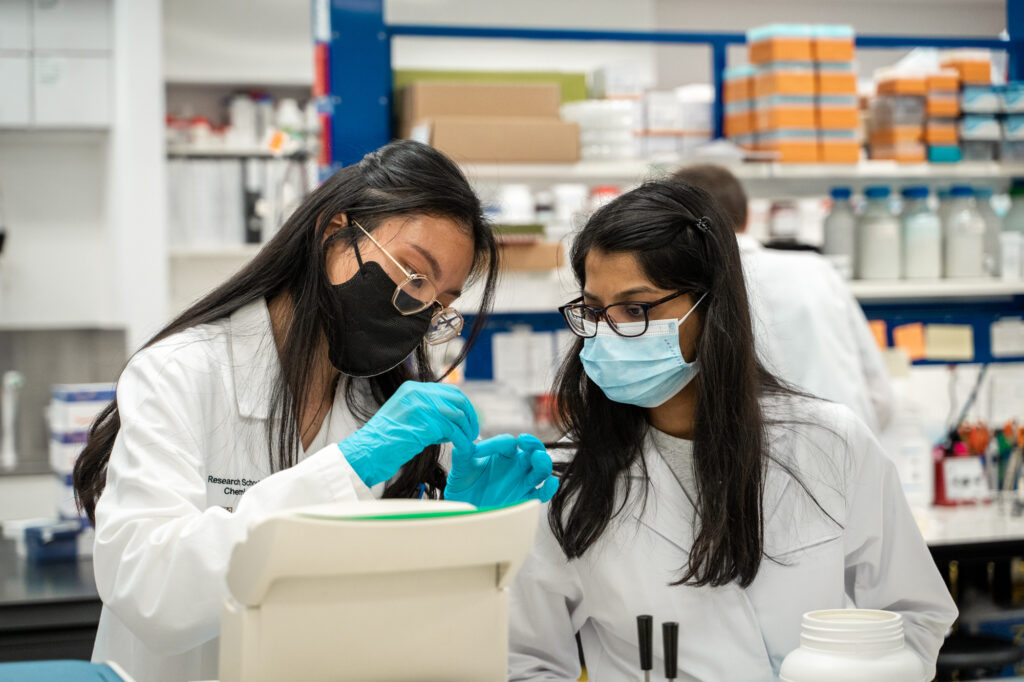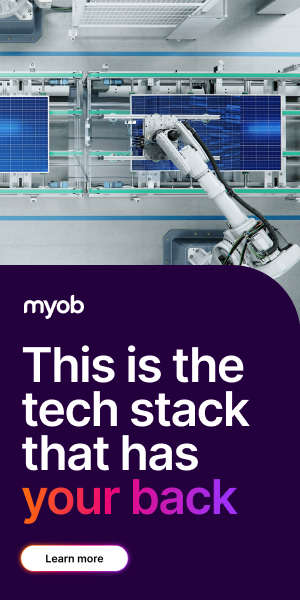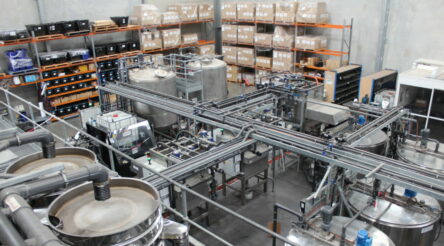Sending a computer-designed “Pac-Man” army into the war on waste

@AuManufacturing’s mission to identify Australia’s 50 most innovative manufacturers continues (nominations close on Friday.) Today we hear from environmental tech company Samsara Eco, which is questing after a mixed bale holy grail. Brent Balinski spoke to founder Paul Riley.
It’s safe to say enzymatic depolymerisation is an unfamiliar topic to most people.
As with any unfamiliar topic, analogies are helpful. Paul Riley (pictured on left), founder and CEO at Samsara Eco – a company applying enzymatic depolymerisation to the plastic waste problem – likes to describe a polymer-processing enzyme as like to a tiny Pac-Man.
His company breeds countless Pac-Men through fermentation. These enzymes are designed by software, and do not exist in nature.
Their job is to chew through polymer chains, reducing them to their smaller monomer blocks.
“Once you’ve achieved that – and it’s only snipping the polymer chain and not actually eating it – you’ve then got building blocks, which are equivalent to the virgin monomers that can then be made back into other plastics or other chemicals,” Riley tells @AuManufacturing.
“And what’s unique about it is that because you’ve gone back to a molecular level, they are fossil fuel-equivalent.”
Samsara officially launched in 2021, with Riley, CSIRO venture investment arm Main Sequence, The Australian National University and Woolworths as its founding shareholders.
Want to join @AuManufacturing’s list of Australia’s 50 most innovative manufacturers – apply to be recognised in this exclusive group here.
Riley, a long-time venture capitalist, earlier teamed up with Main Sequence to focus on a climate change-themed startup working on plastics, which contribute significantly to greenhouse gas emissions throughout their lifecycle.
“You can’t resolve the climate crisis without resolving the plastics crisis,” he says.
Their starting point was the holy grail of plastics recycling, handling a mixed bale
“We went about searching for the technology worldwide and trying to find a solution to that problem,” he recalls.
“And we literally ended up across the road at ANU.”
The company is part of movement following a 2016 discovery in Japan of a soil bacterium. The bug had evolved some time after plastic was invented (making it very new in the scheme of things) and was able to slowly turn PET into monomers. The hunt was on for other, speedier Pac-Men, perhaps able to attack polymers other than PET.
The Jackson Lab, part of ANU’s Research School of Chemistry, are global leaders in enzyme-based depolymerisation, believes Riley. Professor Colin Jackson (pictured right) serves as Samsara’s Chief Science Officer.
The company began with PET and is currently involved in a works program with the Lab looking at 13 kinds of plastics. Samsara can currently process five types, which cumulatively represent about half of all plastics made, according to Riley.
Last week it announced a partnership with activewear company lululemon to turn apparel waste into nylon 6,6 and polyester for use in new garments. (This interview took place before the announcement.)
Samsara is currently in commercial trials with a collection of companies, and operates a pilot line at Canberra. It announced a $54 million Series A round last November.
Riley says they are currently in the process of securing a site just outside of Canberra, where they will build a plant capable of processing 200 kilograms per hour and allowing for commercialisation proofs.
He says the “enzyme to plastic load” is very low as they’ve managed to “immobilise” their enzymes, allowing them to be used for seven days before needing to be refreshed. This is one of many innovations driven by needing to keep costs down and efficiency high, which has been aided by creating a company from the ground up.

When Riley talks about innovation, he points out that it’s a nuanced topic, which is understood differently from person to person.
“I think it’s important in terms of how we frame innovation.. It’s not just a technological advancement; it’s a whole host of culture, of process steps,” he adds.
“We always make sure that [ideas are] solving a problem. There’s no point in innovation for innovation’s sake. You’ve got to actually be solving a problem. And for us, if you think about the way the company was originally formed, that’s at the heart of it… The science was the bit that came last.”
In this episode of @AuManufacturing Conversations with Brent Balinski, you can hear more from Riley about how Samsara’s technology works, why he believes it’s the only “true recycling” (rather than downcycling) option for plastic, and why the nation needs to reverse the hollowing out of its polymers industry.
Episode guide
1:20 – An introduction to Riley and Samsara.
3:25 – The approach has always been with a view to handling a mixed bale of plastic.
4:04 – Enzymatic depolymerisation explained, and its genesis in a discovery in Japan. “The enzyme is like a little Pac-Man.
5:48 – Displacing fossil fuels by harvesting monomers from waste plastic.
7:10 – Enzymes that are designed by computer and new to nature. They can currently handle five types of plastic.
8:58 – How it addresses some of the challenges in scaling up.
10:03 – The only waste that comes out of the process.
11:05 – The low carbon footprint of the process and why this is commercially beneficial.
12:38 – The enzymes like to operate in a temperature range of 45 – 55 degree range and can produce monomers in an hour.
13:20 – The plastic is never melted, which is “fundamentally different” to other recycling approaches.
14:28 – How the enzymes are designed, developed and grown.
15:35 – The timing of their Series A raise and the downturn in venture investment.
16:55 – Why circular plastics hubs are needed and who would be involved.
18:55 – Australia lacks polymer processing capacity, and this presents “enormous sovereign risk.”
20:06 – Innovation and what it means at Samsara.
23:30 – One company is only one part of the solution. Things like redesigning are very important.
25:20 – Why we need to reverse the long-term offshoring trend.
Pictures: supplied
Is your company one of Australia’s 50 most innovative manufacturers? We want to hear from you.
PUT YOURSELF FORWARD AT THIS LINK. NOMINATIONS CLOSE AT 5 PM (AEST) ON MAY 26.
WATCH OUR LAUNCH WEBINAR HERE.
 Australia’s 50 Most Innovative Manufacturers is a new campaign by @AuManufacturing. It has been made possible by the generous support of MYOB, SMC Corporation Australia, and Bosch Australia Manufacturing Solutions. Be sure to check back at this website for regular updates including profiles of nominees and other information.
Australia’s 50 Most Innovative Manufacturers is a new campaign by @AuManufacturing. It has been made possible by the generous support of MYOB, SMC Corporation Australia, and Bosch Australia Manufacturing Solutions. Be sure to check back at this website for regular updates including profiles of nominees and other information.
@aumanufacturing Sections
Analysis and Commentary Awards Defence Manufacturing News Podcast Technology Videos










